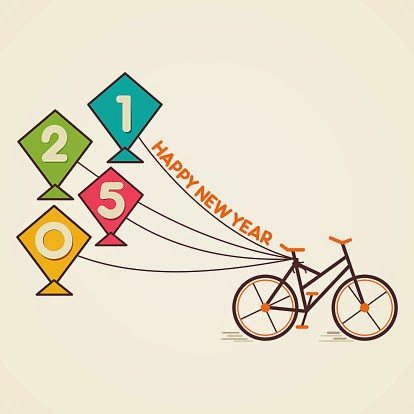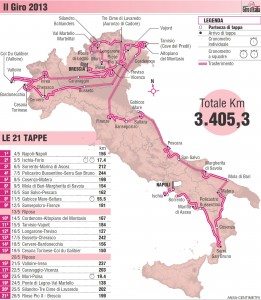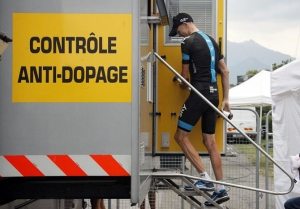
This week has seen some incredible things in professional cycling. With the Tour de France half over, it appears that the win has been seen up by some incredible performances. Some may even think of them as “extraterrestrial” in nature. With a single scintillating attack, Chris Froome shattered his rivals on the first summit finish of the Tour, and possibly his credibility in the process.
In the past, when we've seen inhuman feats of athletic prowess, there always follows a fall from grace in the ensuing years. Truly, after the stage, Ross Tucker wrote an enlightening tweet which I've reposted below:
Cycling just keeps giving gifts. Journos, I'll save you time on your reports – just dig up what you wrote in, say, 2004, and swap some names
— Ross Tucker (@Scienceofsport) July 14, 2015
“…dig up what you wrote in, say, 2004 and swap some names.”
You can read his full opinion on the state of pro cycling after today's stage right here.
We saw Ritchie Porte shatter the field, dropping Nibali, Contador and eventually TJ Van Garderen before Froome accelerated at a brutal pace, distancing his last remaining rival in Nairo Quintana. Oh, by the way, Quintana is arguably the best pure climber of any GC contender in the pro ranks today. Another Twitter user ammattipyöräily calculated the time of ascent and through that and a few other pieces of available information, figured that he was putting out somewhere in the neighborhood of 6.09 watts per kilogram. That's in the range of the admitted dopers of the past, and it was enough to put 2:30 into Van Garderen, 2:51 into Contador, more than 4 minutes into Nibali and even 1:03 into Quintana.
#TDF2015, Stage 10. La Pierre Saint Martin (14.89 km, 7.72 %, 1150 m) Chris Froome: 40 min 54 sec, 21.84 Kph, VAM 1687 m/h, 6.09 W/kg
— ammattipyöräily (@ammattipyoraily) July 14, 2015
It's been a while since we've seen a spectacle like that out of the yellow jersey. And it was eerily reminiscent of Armstrong and U.S. Postal.
Strangely though, any indignation or supposition if doping by Sky is met with incredulity and often open hostility. Why did Armstrong (who admittedly was an asshole) end up on the receiving end of vicious attacks while the Sky project manages to deflect them? Is being a soft spoken Brit really a panacea to doping accusations while being continental European or American is a ticket to scrutiny? Why now do the questions of outrageous performances garner angst and bitterness from others when it's a British team?
Certainly, if the past has told us anything, it has shown us that where there's smoke, there's fire. We're all familiar with the sordid tales of Sky's flirting with WADA code. Not long ago there was the hiring of notorious doping doctor Gert Leinders (and supposedly not knowing of his history despite all the evidence to the contrary.) Sky has also partaken of the services of confessed doper Bobby Julich whom they fired upon his confession. Most recently you have the questionable practice of fast-tracking a TUE for Froome's inhaler, courtesy of now resigned UCI lead doc Mario Zorzoli. To cap it al off, the first rest day of the tour broke the news that Frome's power data had been hacked, modified and released against Sky's wishes.
How much can we suspend disbelief for this team who is not even an MPCC signatory? Even Astana, with all their doping positives, had been members of MPCC until the Lars Boom incident.
The bottom line for me is that I find it disingenuous that all the folks who questioned Armstrong will bury their head in the sand for Froome. Many are quite correct in that there is no “proof” that you're NOT doing something. However a healthy dose of skepticism for what we've seen today should be the norm, as opposed to those who shout mightily that Froome must be clean based on…..the fact that he's not as brash a cheater as Armstrong was?
I don't know the answer to this problem that plagues professional sports in general and pro cycling in particular. I would like to say that the peloton is clean(er) and I do believe that it is (cleaner, that is.) However, it simply goes to show that extraordinary performances will be found to be just that, extraordinary. Should we let Froome get by on his charm alone? Should we question every performance we see and expect it to be tainted before the winner mounts the podium? Maybe so. Maybe that is the way pro cycling will remain until we again feel we can trust those at the top tier of our sport.
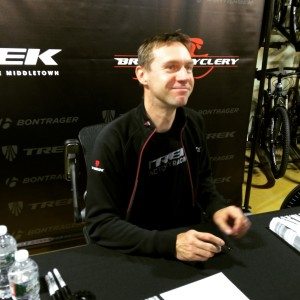
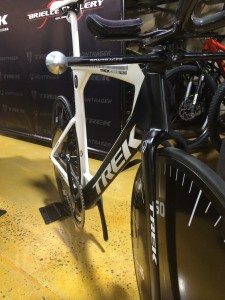 Jens pointed out that you have to believe in yourself. You have to believe in yourself without hesitation or fail, you have to dream big and you have to go out there and “get what you want”. He recounted his horrific crash in the 2010 Tour de France on the descent of the Col due Petit-Saint-Bernard in which he fractured his cheek and sustained a concussion. He regaled us with details like German TV announcers predicting he had a 50/50 chance to survive the night. And then he went on to explain how he was determined to return to racing, as strong as he was before.
Jens pointed out that you have to believe in yourself. You have to believe in yourself without hesitation or fail, you have to dream big and you have to go out there and “get what you want”. He recounted his horrific crash in the 2010 Tour de France on the descent of the Col due Petit-Saint-Bernard in which he fractured his cheek and sustained a concussion. He regaled us with details like German TV announcers predicting he had a 50/50 chance to survive the night. And then he went on to explain how he was determined to return to racing, as strong as he was before.